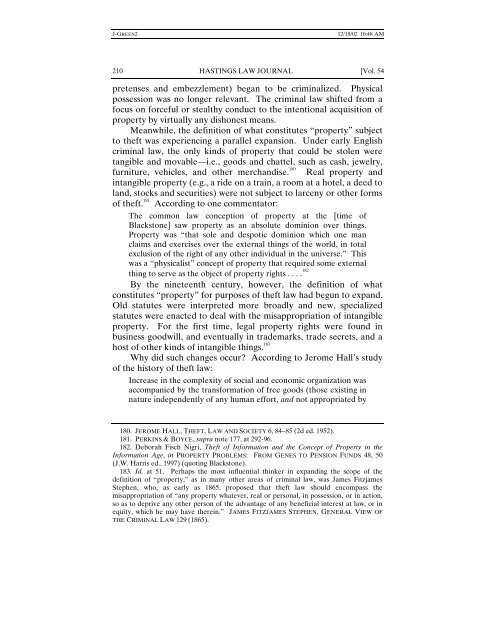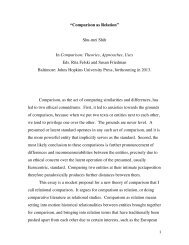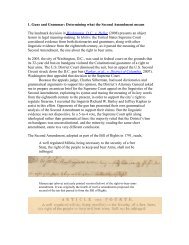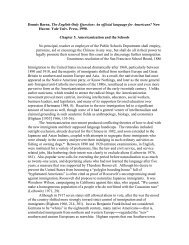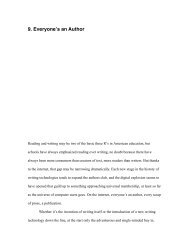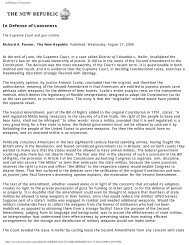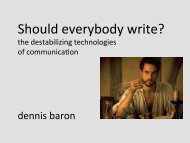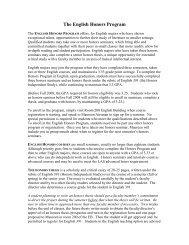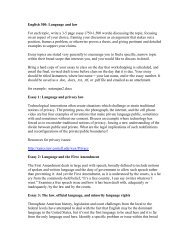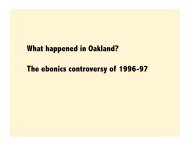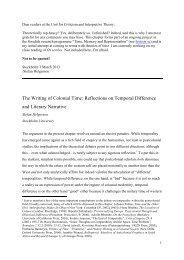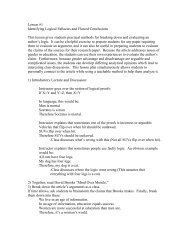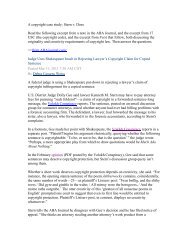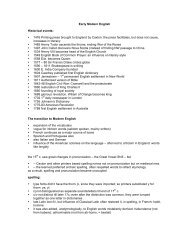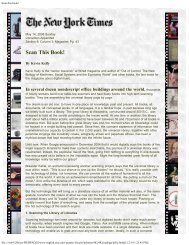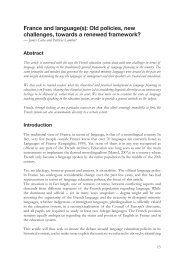Plagiarism, Norms, and the Limits of Theft Law: Some ... - English
Plagiarism, Norms, and the Limits of Theft Law: Some ... - English
Plagiarism, Norms, and the Limits of Theft Law: Some ... - English
Create successful ePaper yourself
Turn your PDF publications into a flip-book with our unique Google optimized e-Paper software.
J-GREEN2 12/18/02 10:48 AM<br />
210 HASTINGS LAW JOURNAL [Vol. 54<br />
pretenses <strong>and</strong> embezzlement) began to be criminalized. Physical<br />
possession was no longer relevant. The criminal law shifted from a<br />
focus on forceful or stealthy conduct to <strong>the</strong> intentional acquisition <strong>of</strong><br />
property by virtually any dishonest means.<br />
Meanwhile, <strong>the</strong> definition <strong>of</strong> what constitutes “property” subject<br />
to <strong>the</strong>ft was experiencing a parallel expansion. Under early <strong>English</strong><br />
criminal law, <strong>the</strong> only kinds <strong>of</strong> property that could be stolen were<br />
tangible <strong>and</strong> movable—i.e., goods <strong>and</strong> chattel, such as cash, jewelry,<br />
furniture, vehicles, <strong>and</strong> o<strong>the</strong>r merch<strong>and</strong>ise. 180 Real property <strong>and</strong><br />
intangible property (e.g., a ride on a train, a room at a hotel, a deed to<br />
l<strong>and</strong>, stocks <strong>and</strong> securities) were not subject to larceny or o<strong>the</strong>r forms<br />
<strong>of</strong> <strong>the</strong>ft. 181 According to one commentator:<br />
The common law conception <strong>of</strong> property at <strong>the</strong> [time <strong>of</strong><br />
Blackstone] saw property as an absolute dominion over things.<br />
Property was “that sole <strong>and</strong> despotic dominion which one man<br />
claims <strong>and</strong> exercises over <strong>the</strong> external things <strong>of</strong> <strong>the</strong> world, in total<br />
exclusion <strong>of</strong> <strong>the</strong> right <strong>of</strong> any o<strong>the</strong>r individual in <strong>the</strong> universe.” This<br />
was a “physicalist” concept <strong>of</strong> property that required some external<br />
thing to serve as <strong>the</strong> object <strong>of</strong> property rights . . . . 182<br />
By <strong>the</strong> nineteenth century, however, <strong>the</strong> definition <strong>of</strong> what<br />
constitutes “property” for purposes <strong>of</strong> <strong>the</strong>ft law had begun to exp<strong>and</strong>.<br />
Old statutes were interpreted more broadly <strong>and</strong> new, specialized<br />
statutes were enacted to deal with <strong>the</strong> misappropriation <strong>of</strong> intangible<br />
property. For <strong>the</strong> first time, legal property rights were found in<br />
business goodwill, <strong>and</strong> eventually in trademarks, trade secrets, <strong>and</strong> a<br />
host <strong>of</strong> o<strong>the</strong>r kinds <strong>of</strong> intangible things. 183<br />
Why did such changes occur? According to Jerome Hall’s study<br />
<strong>of</strong> <strong>the</strong> history <strong>of</strong> <strong>the</strong>ft law:<br />
Increase in <strong>the</strong> complexity <strong>of</strong> social <strong>and</strong> economic organization was<br />
accompanied by <strong>the</strong> transformation <strong>of</strong> free goods (those existing in<br />
nature independently <strong>of</strong> any human effort, <strong>and</strong> not appropriated by<br />
180. JEROME HALL, THEFT, LAW AND SOCIETY 6, 84–85 (2d ed. 1952).<br />
181. PERKINS & BOYCE, supra note 177, at 292-96.<br />
182. Deborah Fisch Nigri, <strong>Theft</strong> <strong>of</strong> Information <strong>and</strong> <strong>the</strong> Concept <strong>of</strong> Property in <strong>the</strong><br />
Information Age, in PROPERTY PROBLEMS: FROM GENES TO PENSION FUNDS 48, 50<br />
(J.W. Harris ed., 1997) (quoting Blackstone).<br />
183. Id. at 51. Perhaps <strong>the</strong> most influential thinker in exp<strong>and</strong>ing <strong>the</strong> scope <strong>of</strong> <strong>the</strong><br />
definition <strong>of</strong> “property,” as in many o<strong>the</strong>r areas <strong>of</strong> criminal law, was James Fitzjames<br />
Stephen, who, as early as 1865, proposed that <strong>the</strong>ft law should encompass <strong>the</strong><br />
misappropriation <strong>of</strong> “any property whatever, real or personal, in possession, or in action,<br />
so as to deprive any o<strong>the</strong>r person <strong>of</strong> <strong>the</strong> advantage <strong>of</strong> any beneficial interest at law, or in<br />
equity, which he may have <strong>the</strong>rein.” JAMES FITZJAMES STEPHEN, GENERAL VIEW OF<br />
THE CRIMINAL LAW 129 (1865).


